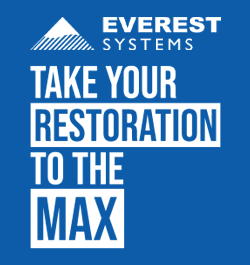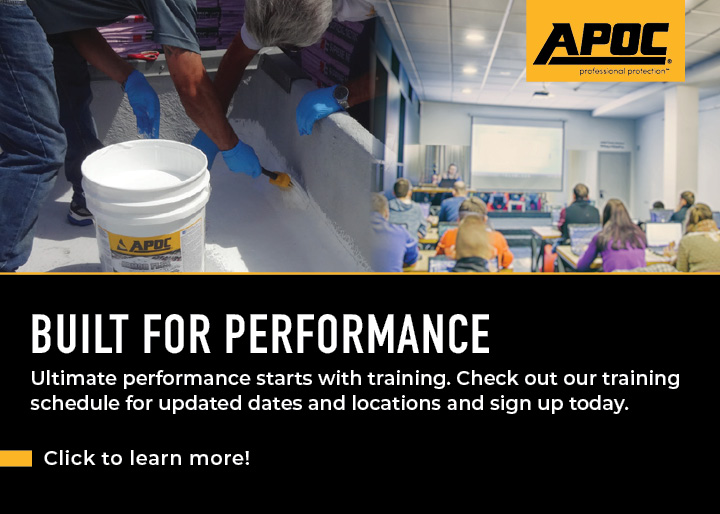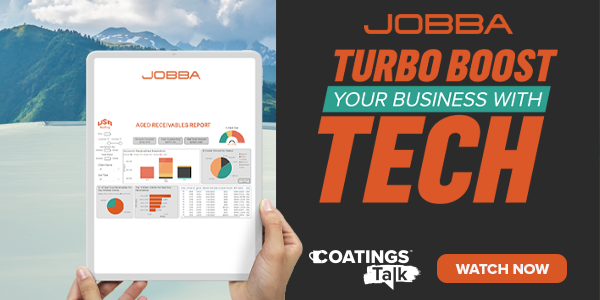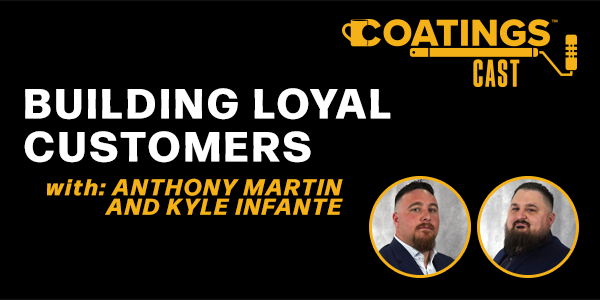UP TO THE MINUTE
Turbo Boost Your Business With Tech - PODCAST TRANSCRIPT
August 7, 2025 at 3:00 p.m.Editor's note: The following is the transcript of a live interview with Zach Carpenter of Jobba. You can read the interview below, listen to the podcast or watch the recording.
Intro: Okay. Well, welcome everyone to this month's Coatings Talk. This month it is brought to you by Jobba. I'm so excited we have Zach here from Jobba.
Zach Carpenter: Hi.
Megan Ellsworth: We're talking about tech and how to boost your business using technology. I'm really excited, Zach.
Zach Carpenter: Me too. It's a good topic.
Megan Ellsworth: It is and with everything going on with AI, you have to be in front of everything right now. So let's dive in and just have you introduce yourself.
Zach Carpenter: Yeah, 100%. Thank you. Yeah, there's a blurb on the screen if anyone wants to read it, but in summary, I was one of the co-founders along with my family of our legacy product FCS. So I've been in the roofing software industry about 17 years now. So I pretty much just spend my days working with contractors, helping facilitate, getting the right software solution implemented into their business and then I work with people to help optimize their experience beyond that too. So when I found out that this was the topic we were going to do, it was just naturally such a great fit. So I'm just excited to hopefully bring some value to everyone today.
Megan Ellsworth: I'm sure you will.
Zach Carpenter: We'll try.
Megan Ellsworth: Just so everyone knows, the chat is open. So if you have questions throughout the presentation today, please feel free to throw them in the chat or some comments, chats, whatever. We'll be able to get to those either throughout or at the end. Either way, we'll be answering your questions. So don't be afraid and don't be shy. Okay, so let's level-set, set the stage here. What technology trends right now are making waves for roofers?
Zach Carpenter: Yeah, 100%. I mean the big thing and I've seen this evolution going on just with the time, I mean when we were first starting FCS, it was like iPhone 2. So as everyone was still pay based, I remember we were initially working with contractors. I mean and some people will probably laugh at this, but using laptops and the digital cameras and then the data compilation and having to bring all of that back into the office and so over the last say, decade plus, I've seen big trends in the direction of, initially it was just CRMs, right? Having any software program at all was a big deal.
And then we've come a long way since then. I would say modern day trends that we typically see. AI is obviously becoming a big up and coming thing. I don't know that we're all the way there yet in the industry, but it's a direction that I think everyone's excited about. I'm familiar with some pretty practical applications, but other than that, it's really just still trying to get a bulk of contractors off manual paper-based models, right? So implementing databases and CRMs and connectivity between the field and the office. Those are some of the biggest things that I typically see are making waves right now.
Megan Ellsworth: Yeah and absolutely getting away from paper, especially in those kind of touchier areas like finance is and all that stuff and really utilizing the tools that are at our fingertips.
Zach Carpenter: Exactly.
Megan Ellsworth: For things like marketing, sales, what have you.
Zach Carpenter: And you bring up a good point, right? There's a lot of different items. So I would say if we were to identify a big trend that I see right now is people working to try and integrate, right? Is trying to make all your different products and all your different solutions connect together, I think is probably what people are most focused on right now. That and then dialing in accounting. There's nothing wrong with QuickBooks and it's better than nothing for sure, but it's completely sufficient for most contractors up until a certain point. So I typically find people have some sort of base right now and it's about trying to figure out how to optimize it all and then get it to work together.
Megan Ellsworth: Yeah, because it can be really overwhelming for a lot of people. I mean even myself as someone that works with technology on a daily basis, sometimes you just want to throw your hands up and say-
Zach Carpenter: Totally. Enough.
Megan Ellsworth: That's what I was going to say.
Zach Carpenter: Exactly.
Megan Ellsworth: Okay, so let's talk about how the right technology can support the profitability of a roofing business in these uncertain times.
Zach Carpenter: 100%. A big thing like at FCS and Jobba that we take a focus on. I know the first item here is increased sales and how does technology help do that? I mean it's dependent on the type of technology, right? We'll be able to get into some of the other items, but the specific thing I want to talk about right now is with our legacy product FCS, we follow a proprietary business model that we call the FCS life cycle. The life cycle is a proven business model that allows contractors to scale more into the private negotiated market and do more with private property management groups and get into that service and maintenance world, right? So one, I would say finding a software that's conducive to the goals of the business.
So if you're a residential contractor or a small contractor who wants to migrate into that private world, that service and maintenance world, some stuff like what we offer in FCS and the life cycle model can greatly help with sales, but then beyond that, not just from tech in general, I mean visibility in your CRMs, lead management, connectivity between your different teams, being able to forecast the KPIs and metrics are huge. I mean that's as we transition into this more digital age in the industry, these are essential items that I feel people have to get on board with, but then beyond that too is visibility into the company and being able to track analytics and measure success on jobs and measure performance of your individuals. You can do those things without technology, but it makes it a lot harder, right?
Megan Ellsworth: So true.
Zach Carpenter: And enabling access to data that usually isn't or otherwise wouldn't be available, which I'll talk about a little more. I know we have another topic that's pretty conducive to that too and then I guess I would probably say on the last thing, improving scalability. I mean we see all the acquisitions going on in the roofing industry these days, right? You want to make your company repeatable and scalable, which means it's sellable, right? So beyond the internal benefits, beyond the external benefits that the technology adoption provides, having systems and platforms in place that allow you to scale the business, that's the way you do it, right?
Megan Ellsworth: Yeah, we have a question here from the audience actually.
Zach Carpenter: Totally.
Megan Ellsworth: What metrics should a company be tracking to make sure their technology investments are actually boosting their profitability?
Zach Carpenter: Totally. Yeah, that's a great one. That's a great question. To tracking the technology, I mean you want to keep up with the implementation and the onboarding. I can't tell you how many contractors I work with that make technology purchases or make decisions on different systems and then they don't keep up with making sure it gets implemented into the business the right way. So they just end up spending money or wasting money on solutions that they don't end up getting the most out of and so I would say specific metrics, it's going to vary based on whatever company you are, what your business model is, different things like that. But if I were to put a generalized answer, I would say just make sure you're actually using the things you buy. It would be a pretty important one, right?
Megan Ellsworth: Yeah, no, that's so true and making sure that you're not just you, maybe if you're the business owner, but your team is using it and it's not adding to their daily time that's taking away from something else important.
Zach Carpenter: 100%.
Megan Ellsworth: Yeah. Okay, so to the next slide, how does technology bring convenience to running a roofing business? Let's talk about of that.
Zach Carpenter: Totally. Yeah, no, 100%. I mean let's think about even just something as small as having a centralized, like we use Google Workspace, it's where our emails are, it's where our calendar is. It centralizes the data. I'm sure you guys probably have a CRM or a system where everyone works. Perfect. Exactly. So one is centralizing, right? You want to make sure all your stuff is in the same place. People are working in the same area and you want visibility, right? And not just generalized communication, but again, visibility. Where are your people? What are they doing? And being able to make sure everyone's accessible, right?
And that then segues into then what do you do with it? You have everything in one place and that's where you can then start to measure these metrics and implement KPIs and things like you hear about key performance index and what is that? What does that even mean? I have sales goals, guys got to sell this much every month or we got to bid on this many jobs, but I think just centralizing the data is the first step and then you can worry about what to do with it, right? So for me, that would probably be the biggest thing.
Megan Ellsworth: Yeah, absolutely. So what some tools that you see out there in the market that simplify the communication between field crews and office staff?
Zach Carpenter: Oh, 100%. I mean my personal favorite ones probably either FCS or Jobba, but hey, little plug, but other than that, I mean there's other tools, right? I mean, CompanyCam is very popular. That's a program that a lot of our clients actually use within our application and bridging the gap between the field and the office to me is one of the first steps people need to take in getting into this is centralizing the data and then bridging that gap, but I would say FCS, Jobba, like a CompanyCam and if you're not ready for anything like that too, just get a Google Drive or if you use Microsoft and you want to use 365 or whatever, but have a place where everything can go because the guys in the field, they can still just take the pictures on their phone.
I mean if you really wanted to, a contractor could have an iCloud account where they just take all the pictures and then syncs, but they got to have people on staff that can help them do that or be able to get access to resources. There's a lot of groups and companies and partners out there that you can work with that can help optimize that experience and find what's right for each contractor, but I think it's hard to just generalize because so many contractors are so different, but I would say that's a big one and yeah, I see here, I'm trying to look at the comments as we're going, a couple comments about CompanyCam and absolutely, that's a great tool and resource, but again, if you're not ready to commit to subscriptions or whatever, there's other ways you can simplify stuff still too.
Megan Ellsworth: Yeah, there's Apple, you can do a shared photo album if you're desperate.
Zach Carpenter: Exactly.
Megan Ellsworth: Love the Google Drive idea.
Zach Carpenter: 100%.
Megan Ellsworth: So it's good to know Jobba and FCS have integrations with other companies, so that's great to know. So you can build a tech stack.
Zach Carpenter: Exactly. Yeah and a lot of tools these days too, there's Chrome extensions and we are excited with FCS and both with Jobba of our API capabilities, the importance of being able to bridge these gaps is huge, but you'd be surprised what you can get away with without having to have an integration, right? That's kind of an intimidating word and it can be sometimes, but there's a lot of tools and resources that can still just work together. From what I'm specifically referencing is CompanyCam. They have a Google Chrome extension, right?
FCS is a Google Chrome backed system. So when you're in the office or you're logged in on your desktop browser using Google Chrome, you can have your CompanyCam extension right there on your bar at the top on your extension bar and while you're working through FCS, you can just load photos right from it. It's not that we worked with CompanyCam to build this special integration. It's just the way these tools work these days. So it's good stuff. Yeah and especially accounting programs and a lot of people get caught up in the verbiage and the language of integration and there's probably other areas. Well, I think we'll touch on finance later, so I'll save it for that.
Megan Ellsworth: Exactly. Okay, so let's talk about specifically small businesses, how some of these technologies can help augment resources for small businesses.
Zach Carpenter: Totally. Yeah, 100%. I guess we'll start with labor. I mean labor costs for small businesses. Again, if you can bridge the gap between the field and the office to be able to plug these things together and it's going to save the time and hassle of your guys having to come back, load all the data, transfer it to someone else, reduce the amount of times that they have to go back to job sites, because they forgot this. I'm of the mind of take all the photos, document everything while you're there and do the best you can, right?
But then these tools too, especially on the topic of labor is getting better visibility into that. We have a specific report inside of FCS that's one of our advanced service reports that tracks labor and material profitability of your service crews. So it's going to go through and give you access to, if you guys are taking a little too long to do a repair or they're wasting too many materials, you'll have the visibility on that to know, "Oh, they might need more training." But in terms of just reduced labor costs, just streamlining everything, right? Your guys aren't sitting there having to spend time uploading pictures or sending it to the office, which is massive and I think that saves a tremendous amount of time in the grand scheme of things.
Megan Ellsworth: Yeah, that's so huge because time is money.
Zach Carpenter: Exactly. 100% and then yeah, if you want to talk about the DIY.
Megan Ellsworth: No, I was just going to prompt you because I'm so excited to hear what you have to say about these different programs like Squarespace, Canva, there's some AI things we were talking about in our practice.
Zach Carpenter: Totally. Yeah, no, these are all just great tools like I was saying. I mean ideally if you can get into a centralized platform, that's the go-to. Get something like FCS or Jobba or whatever your preference is, but beyond that, there are so many solutions available to people that can provide so much benefit. I mean Canva for example, I know most people in a creative space love Canva, being able to design new flyers or new brochures or do good maintenance agreements or better re-roof proposals or presentations for budget meetings with clients. There's just so much you can do with it. You just got to get in there and play around. They've made these programs so much less intimidating these days where it's like you can just sign up and start creating stuff.
Megan Ellsworth: So true.
Zach Carpenter: I know and just the use of different, like ChatGPT for example can be such a great resource to help you price out jobs or answer questions. I mean I use ChatGPT like my new Google these days, right? Just go in and ask it the question and work through it. These resources are available and they're vast and there's so much more. I mean you start looking at Squarespace and building out your website. There's all the plugins in the world that you could possibly need for scheduling for appointments, for taking payments, for processing, whatever and so getting reports, analytics, it's chat box, it's all available and I realize a lot of times, not every roofing company in the world is equipped with individuals that can figure all this stuff out, but like I said, there's resources that can help you figure it out.
Megan Ellsworth: Yeah, I always say if you have a 20-year-old in your office, recruit them to go figure it out. I put the link to Canva in the chat in case anyone hasn't heard of it and wants to check it out. It's like a graphic design website where you can really easily make your own designs and do all sorts of stuff like posters, flyers, brochures like Zach said and it's so awesome. I love it.
Zach Carpenter: It's a very helpful tool.
Megan Ellsworth: It really is. Okay, so we had a question from John Kenny. Hey John.
Zach Carpenter: Yeah, what's up, John?
Megan Ellsworth: What email products integrate with your systems?
Zach Carpenter: Oh, absolutely. That is a great question. So like I said earlier, we're super excited about our new API capabilities, which is just an open API. So I mean the most popular ones are probably going to be Gmail and Outlook of being able to set up integrations, because like in FCS for example, we have it tied in through mailguns so that when you send an email from the system, it's going to come from your natural email and paste a copy of it into the notes of the record and then when the customer responds, it just goes into your email, but with the new API capability, you could have that email paste back and have the full conversation right there inside of your FCS notes category. So I would say the two most popular ones being Outlook and Gmail, just knowing that those have connectivity availability, I don't know. I'm sure some people use Yahoo. I haven't tried it personally, meaning I've used Yahoo. I haven't tried to integrate with Yahoo, but I can't imagine that it doesn't, right? Does anyone still use Hotmail?
Megan Ellsworth: I don't know. What about AOL.
Zach Carpenter: I actually, I do have a friend, an older gentleman that I help with his computers and stuff sometimes and he uses AOL still. Yeah, I collect football cards sometimes and so he is a guy I met in the industry and he always calls me, "Hey, I can't get my computer going." So I try and help him. Yeah, he's using AOL still a little while.
Megan Ellsworth: I love it.
Zach Carpenter: It's cool.
Megan Ellsworth: Okay. So how would you say tech is changing labor in the industry and how people hire people or find labor, all that stuff?
Zach Carpenter: Yeah, 100%. I mean the first one, do more with less. I mean that's a fantastic point to all of this is the software might as well and I don't ever advocate for replacing employees. That's not what I'm saying, but a good software stack can do the job of a couple people, right? And so it's like being able to enable these things for your business can make everyone so much more efficient and just take you that much further. Time management, I mean visibility, being able to see if people are going over how much time they're spending on jobs, being able to project and forecast on a large job on a daily basis, what's the hours being consumed? Right?
I mean otherwise you're just guessing on a daily basis throughout the span of the project. Sometimes these projects go 30, 60 days plus larger jobs and then you start looking at service and you're doing time and material billing, calculating the time and the travel and the labor, having all of that automated and centralized, the benefits of getting paid faster are all vast, but then beyond that, just the ability to have the transparency and the visibility that you need for it all and then lead collection, I mean let me see, what did we mean for lead collection in labor?
Megan Ellsworth: I think how people are following up with leads?
Zach Carpenter: Yeah, that makes sense.
Megan Ellsworth: How they're coming in and how the-
Zach Carpenter: Totally, like an ability to get to people quicker. You have a customer goes on your website and fills something out and you get notified right on your phone and your speed to lead anyone in a sales capacity should be familiar with that phrase. Speed to lead is everything. If someone reaches out to your business and want to interact and do business with you, you need to get on them and instead of waiting to check your voicemails at the end of the day or going in and only checking your email once a day, having these devices that give you connectivity, you can speed the lead. I mean here if someone fills out a demo request and they want to look at the software, I try to get to it immediately, but if it goes longer than 10, 20 minutes and sometimes people are on meetings, you do the best you can, but to me, if a lead comes in, you drop everything and reach out to that customer.
Megan Ellsworth: Yeah, that's great philosophy. For everyone out there that's listening that's like, "Okay, this is all great." But how do I implement all of this? Where do they go maybe somewhere like Jobba or FCS to implement technology like this to get that speed to lead process going?
Zach Carpenter: Yeah, I mean in terms of where do they go to do it? Like I said, John's on here. He's a great resource of being able to help people dial this in because this all sounds great in theory, right? All of these benefits, but you got to practically be able to implement it and in order to practically be able to implement it, your business needs to be positioned correctly. You have to have the right goals, you have to have the right processes, you have to have the right drive and reasons that you're doing these things. So there's another individual, Jim Rizzo that is offering software optimization services.
He's been in the industry 17 years and has a company called XO Impact Solutions that helps optimize software experiences and John Kenny that's here listening in works with customers to be able to help them on the business side of making sure that everything's dialed in. So if anyone's out there and you're trying to achieve these type of benefits and you're looking to get these type of results and you're not sure where to start, there's experienced individuals in the industry and I'm happy to help anyone too that has questions. I'm an open book, I'm happy to help anyone, but find a dedicated resource that can help you navigate this field, if you will.
Megan Ellsworth: Yeah and if you're looking to get a program like Jobba, CompanyCam, FCS, what have you, your teams are there in the implementation of a-
Zach Carpenter: 100% and it's essential in my opinion that you need to be involved in the implementation process and you need to work with your provider to ensure that success. So if someone purchases FCS or Jobba for example and it's the biggest department in our company is the onboarding and training and customer support. We do kickoff calls where we go through your goals and your objectives and making sure that we're lining up the software with where the business wants to go and then it's handholding in a way where we walk through the training and sometimes people want to move fast and they want to get going and I love the urgency and the excitement, but we also want to make sure that things are done right. You want to make sure the system's set up correctly, that your settings are configured the right way, that you're dialed in from the beginning so that you don't have to backtrack later on, but yeah, that's absolutely true. We try and work with people as much as we possibly can.
Megan Ellsworth: Yeah. Have you seen any contractors that you're working with or just in the industry, have you seen them use technology like ChatGPT or what have you to better onboard and train their employees that they're hiring, they're new people?
Zach Carpenter: I haven't seen many people do it successfully yet, but you bring up very good points that it can, right? It 100% can in my opinion. I mean AI is a vast, broad term. You think of AI and some people think of ChatGPT or what you get from Gemini when you Google something, but beyond that, there's so much more. I mean you look at tools. I think you actually use this too like Otter, right?
Megan Ellsworth: Oh, yeah.
Zach Carpenter: Otter can join your meetings and make documents, not just write the notes of what you guys talked about, but it can take screens. When I do my demos and present software, it can make me a training guide by the time I'm done, right? So it's like leveraging the AI software capabilities so much more than what you even think off the top is possible, really can go a long way and so in terms of getting people trained and onboarded, haven't seen anyone do it super successfully yet, but these things are new, right? And I fully anticipate that people will start utilizing this for training for their guys. I mean just think of documenting a service repair, right? You could record the repair being completed and load it to an AI program similar to Otter and it'll spit you out a training guide.
And now you have a here's how to reflash this roof repair or here's how to repatch this roof puncture or whatever it might be and then you've got documentation, you've got guides, you have walkthroughs and then you have a system where you can attach it, make it accessible to people or put it in your Google Drive. So the opportunities with these things like I said, are vast. It's just about we're in such an early stage with that and the roofing industry has always commonly been a handful of years behind what we see in a more consumer environment. So I think it's all coming. It's just a matter of time.
Megan Ellsworth: Yeah and maybe this webinar is the start.
Zach Carpenter: Hopefully.
Megan Ellsworth: You never know.
Zach Carpenter: Right? Maybe someone heard that and they're going to make some training manuals on roof repairs. Love it. I think I saw Michael Black in here. Do that for your text, man.
Megan Ellsworth: Yes, I love it. Hey Michael. Okay, so kind of on that note of AI and how technologies like Jobba and FCS and Canva, what have you, how can they lighten the task load for people these day-to-day tasks? How can they be lightened with technology?
Zach Carpenter: I mean the buzzword would be streamline, right, is do you want to streamline these processes, right? You want to reduce your day-to-day load for let's start with payroll and accounting, but we'll focus more on accounting. Let's say invoicing. Oh, I'm big on the service and maintenance world, so I'm going to reference a time and material ticket. Let me get a piece of paper. Instead of having your technician come back to the office and go, "Here's what I did on this job. Here's how long I was there and here's what I did."
And then someone in the office has to sit and try and translate what they wrote on their scratch paper, put it into QuickBooks, develop an invoice and appropriately build a customer for the time. They all use their phones. A lot of people say, "Oh, my text will never do that." They know how to use Facebook and Instagram and TikTok. They can figure out how to punch in to a job. I know they can and as opposed to just having them fill it out on their phone and then the office can just have it translate the time automatically where you get to a position of reviewing invoices and approving them as opposed to creating them, documenting them, transcribing everything is very important.
Megan Ellsworth: Yeah, that's so important and how can estimating be positively affected by some of these technologies?
Zach Carpenter: That's a big one and probably one of the most important items in most roofing companies is being able to price out these jobs. Standardizing, being able to have estimating templates or standard estimating workflows or I know most people, I like to say that Excel or spreadsheets is the most popular estimating tool out there. There's the Edge, FCS has an estimating tool. Jobba has an estimating tool. There's various other residential ones. Most people use spreadsheets though and so the ability to standardize and make sure that within your organization that people are estimating the same way and the same methodologies and have different ones. Various roofing systems require different components, require different templates. I'm a big fan of John Kenny's work that he does. He actually specifically teaches people how to build these estimating templates and have all of that in place. So that's again, I'm sorry, my cat's jumping in. I'll promote that there too, but yeah, having good streamlined estimating systems and workflows is essential in my opinion.
Megan Ellsworth: Yeah. Okay, we got a question here from the audience. Are there any apps or platforms that are especially useful for managing subcontractor work?
Zach Carpenter: Subcontractors, interesting. In FCS specifically, I will say we do have an area that allows you to work with different subcontractors and manage relationships with them. So jobs, opportunities, they've been involved in, jobs you've invited them to. So FCS has a really good one. Jobba has a really good subcontractor model too. In terms of standalone systems though, I'm not super familiar with a ton of them other than outside of what we have available. I don't know that there are a ton of independent ones. I'm sure we could come up with some good additional methods, but like I said, FCS has it built in pretty well where you can essentially have a whole profile for the subcontractor and have notes and their contact information and track jobs you've given them. That's a very helpful resource.
Megan Ellsworth: That's perfect.
Zach Carpenter: Yeah.
Megan Ellsworth: Okay and then we have actually another question here. Do you see the rise of AI changing the kind of roles roofing companies are hiring for?
Zach Carpenter: AI changing the roles that roofing companies are hiring for. I mean I don't know about AI specifically, but technology for sure, like we talked about earlier, right? Find a 20-year-old, find someone young that you can drop into the company that can pick these things up, but I think drastically, I mean looking for someone that if you had two candidates, one of them just has all the roofing knowledge and the other one has the roofing knowledge plus has the ability to utilize software or some basic level of understanding of technology. In my mind, that person should win every time. So I mean I think it for sure should if it's not just because different, I think they should probably rethink it. If I owned a roofing company, I would for sure be trying to leverage people's skill sets and only hire people that were capable of, maybe not only, but predominantly hire people that were capable of doing those sort of things.
Megan Ellsworth: Yeah and I think ultimately too, things in your company that you do specifically can be taught, roofing can be taught, whereas sometimes the technology is a little harder to grasp onto. So finding that person that might not even have the full roofing knowledge but has the technology knowledge is a plus.
Zach Carpenter: Totally and it can go a long way.
Megan Ellsworth: Yeah, we have another question here. Thanks everyone for the questions. Do any of the pre-built estimating tools have APIs that identify real-time price changes from material?
Zach Carpenter: Not as much. You don't see it as frequently in the commercial world. In residential, you do a lot of, I think AccuLinks has live integrations with GAF and a couple other providers. So I would look for that, but I would say most estimating solutions these days, again, mostly in the residential capacity and I think it'll start to happen more in commercial, but definitely do where they have those integrations with the backend because all the material data is stored, right? So they can link those things up and if not, if you're using a program that doesn't have that built in, it doesn't mean you can't work out ways to make it connect. Like when we talk about integrations and stuff earlier, you could use a middleware like Zapier and connect it to just a private spreadsheet that you own and just house your own pricing lists right there and feed the data back and forth. So honestly, the possibilities are endless of what you can do, especially with the landscape of where things are today.
Megan Ellsworth: Yeah, great news, endless opportunities.
Zach Carpenter: Endless.
Megan Ellsworth: Also great news, endless opportunities.
Zach Carpenter: Yep, 100%. I think that's great news.
Megan Ellsworth: Yeah, it is great news. Okay, so what are some of these easily implemented softwares that have the highest ROI?
Zach Carpenter: 100%. We'll start with the first one, CRMs, I'm going to like I said, FCS, Jobba, our life cycle model that's separate, I think is a huge differentiator when you start talking about ROI, because ROI is big, right? It's how do you measure that? Is it just internal benefits that you're looking for? Is it the external benefits you can provide to your customers to help you increase sales? It's very encompassing. To me though, I would say FCS or Jobba as a primary CRM. If you're residential, Acculinks or Leap or JobProgress, there's so many different residential tools that are available, but having a dedicated CRM and system would be your number one. You're going to recognize a massive return on that investment. Then you start looking at payment platforms, right? Depending on your accounting program, you probably have a payment processing system built into it, like QuickBooks uses into it and there's Stripe and then if you're using your website, a Squarespace, you can plug in whatever.
So there's tons of them, but in looking at that too, payment platforms, how can you track ROI in a payment platform? You could help reduce pay cycles by being able to have digital invoices that you can send to people that they can just fill out electronically. I have some clients too that'll take electronic invoices and they'll put the link into their FCS invoice so that the customer can just click and go do it or there's a lot of great things with that and then project management, I mean that's vast. Being able to electronically get a hold of these jobs, store and track cloud documents for all. I mean there's so many documents and different items that you need to manage when you're doing a large roof replacement job. Being able to send, let me fix my blur on my camera. I noticed it.
Being able to centralize all of that is so important and I mean then scheduling and visibility and there's all of these things that it should have a vast ROI. I always say to my customers that with FCS and Jobba, if the system isn't paying for itself, you're not using it right and I believe that that should apply to any piece of software that you're implementing into your company. If the monthly subscription does not cover its cost at a bare minimum, then you're not doing it right, because these tools are built to improve your company. Someone didn't just make this software and think like, "Oh, this isn't going to do anything for anyone." And I bring it back to optimizing your existing systems and getting the most out of what you're using, because if it's not paying for itself, odds are you're not using it right and I guess there are some times where it's not working, but that's less frequent.
Megan Ellsworth: Right and well, in that instance too, I mean the squeaky wheel always gets the oil. So if its paying for itself, then making sure that the company that you are subscribed to is making sure that it starts to pay for itself, right?
Zach Carpenter: Exactly.
Megan Ellsworth: Because you're making sure that you're squeaky wheel, making sure all of your team knows exactly how to work it and that you're getting that support from the company as well, which I know FCS and Jobba is really great at.
Zach Carpenter: Exactly and we try to be right and can't always do everything. We do the best we can. You can lead a horse to water kind of concept and so there is some different accountability levels where especially I've worked with some contractors that need to put their foot down a little bit with some of their people because let's face the reality, people don't like change. Even if there's positive benefits and things like that and some of your managers and your employees and things like that, they don't own the company. So to them, learning something new or doing something different is just more of a hassle, really and a lot of times you have good people, they understand that the benefits outweigh it and it actually makes their job easier and it's a win-win for everyone, but there are times that business owners or roofing company owners do need to take accountability and put their foot down and tell their people, "No, this is what we're doing."
A good story is I have a contractor that built a good relationship with out of Colorado and one of the features in FCS is a tool called Quick Bid and I always joke that it's like the would you fries with that concept. So it's like during a service call, you can document and propose additional repairs. So if you're just going out to fix a leak, but then your tech identifies a handful of other items, they can do a quick bid that will create a repair proposal right there on the spot that the office can send off to a decision maker, all just like this, right?
And he had this instance where he was trying to implement this because their business model is they want all the little jobs that everyone else doesn't want. So every time you step foot on a roof, they want them documenting these items and he had a tech that just was like, "No, why would I do that? I'm here to fix the leak. I'm going to do that and leave." And he had to make an example of him and fired him in front of the entire company and said, "You do Quick Bids on every job or you don't work here." And they had to let the guy go and it's that kind of accountability that you need sometimes because these things are that important to the business.
Megan Ellsworth: Yeah, that's a really great example because that's what these conversations are all about, right, is those tangible takeaways of yeah, sometimes you have to make the tough decision and like you said.
Zach Carpenter: You do.
Megan Ellsworth: Hopefully you don't have to, but sometimes.
Zach Carpenter: Exactly. Hopefully everyone just gets on board and they understand, but life's not always not that easy,
Megan Ellsworth: Is there any advice you would give to the people out there listening about that, how to position it to your team as this is going to help you in the long run to not stay after work or whatever?
Zach Carpenter: Yeah, no, you said it really well, is positioning it to the team that it's a good thing, not only for the company, but for themselves too and a lot of times, that comes off having good processes, having good training materials. You got to make it easy for your team to adopt new things. That's very important, but you said it really well, you got to just level with people and say, "Look, we have to do this. We can't just keep going out there and manually doing this or we can't keep doing our service work orders on paper anymore." It's got to differentiate ourselves. So I think it's just about leveling with your people and trying to get them to resonate with the objectives.
Megan Ellsworth: Yeah, totally. Okay. So on that note, what are some hesitations you've seen contractors have about technology and how do you address them?
Zach Carpenter: 100%. I mean I guess we'll start at the top, worth the money. I mean that goes back to what I said before. If it's not paying for itself, you're not using it right and then these things can be costly. They're not cheap, but their reason they're not cheap is because they're beneficial, right? Nothing good in life is free, essentially or most of the time it's not. So I think that's the big one is you got to make sure that if you're going to make this level of investment into your business, that you're picking the right solution and that it aligns with the objectives and goals of your company so that you can maximize that ROI. So for number one, if it doesn't pay for itself, you're either using it wrong or it's the wrong program. User-friendliness, I mean like I touched on earlier, I hear a lot of people being concerned that their techs in the field.
I mean sometimes, but it's not very common where a business owner is worried about their office team or their admins being able to do this. It's usually their field techs and what I would say in that is yes, they can. Like I was saying earlier, do they text? Do they go on social media? They do. Almost everyone knows how to use a smartphone these days, right? And you can simplify it. I mean if you're worried about that too, you can strip the phone down to only have a few things, but the systems, especially roofing specific software like FCS or Jobba or our Bitpad product or anything, even CompanyCam too, they try and make it really simple and that's intentional. So what I will say for that is you can teach an old dog new tricks, number one and number two, these things are a lot easier than people think and you got to give your guys some credit. Can they click three buttons and take a picture? Yeah, they can.
Megan Ellsworth: A lot of times, people looking for jobs out there are looking for a company that's very technology forward and willing to bring in new things and new technologies. So a lot of times that's a hiring point as well.
Zach Carpenter: 100%. You bring up a really good point with that too because I know the roofing industry sometimes can struggle with attracting good talent. That's always a hard thing is finding people that want to get involved in the industry and you're right. You can use that as a leverage point of that you're a technology forward company. I've seen recently over the last few years, even people that I have personal relationships with that get jobs at roofing companies as their tech admin, right? It opens up a whole new job possibility and career path for your people. So yeah, that's a great point.
Megan Ellsworth: Have you seen any success stories of some of these old school roofers getting comfortable with these new technologies?
Zach Carpenter: Oh, yeah. Especially when we go to the IRE trade shows or any of the other shows. These guys come up and they love to brag about it. Oh, yeah, I know how to do this. I even teach them how to do it. It's 100%. Like I said, you can teach an old dog new tricks and I see it every day.
Megan Ellsworth: Yeah, that's awesome. I love it. Actually, before I move on, let's talk about data security a little bit.
Zach Carpenter: Totally, that's a good one.
Megan Ellsworth: Yeah, what are some things people can do to make sure that their data is safe?
Zach Carpenter: 100% and so I'll speak from a point of experience with our softwares with FCS or Jobba or Bitpad or any of our products is they're cloud hosted, right? So we use services like Google or Amazon or Microsoft or these big companies that we utilize their cloud servers, right? And it's a level of comfort because I do still deal with contractors sometimes that don't trust the cloud if you will and so again, it's just a comfort level thing that I think people are going to have to open up to. I mean in terms of data security, one, if someone really wants something, even if you have a local server in your office, which I don't know a lot of people that are out there hunting for project data, but if they are, I mean if people have a motivation, they'll figure it out.
But I will say though, using cloud technology and cloud servers and hosting all of these things is very secure. There's backups. It's an extremely secure environment and so I think it's just important and as you're working with different software providers, I deal with it all the time when we're doing presentations is ask the questions about who you're hosting with, make sure the data's being hosted with reputable companies like Microsoft, Amazon, Google, different things like that.
Megan Ellsworth: And then passwords, how often should those be changed?
Zach Carpenter: Yeah, I mean I think the important thing with passwords is try and follow the recommendations that the system gives you. Use multiple characters. Try and think of something unique. In terms of changing passwords, I mean try and implement a couple times a year. I personally don't think it's necessary that you need to do it once a quarter or do it every month or in my opinion, it's not doing much, but have unique passwords, right? Don't make your password, password123. Make it a combination of a few different words and add some letters and special characters, but you're pretty safe. Like I said, I mean if someone's really trying to hack into your system or something, they're just going to try and find a way in. They're going to try and get through a back door. They don't always just need your password. So yeah, I mean keep an eye on it. If you have data breaches or things like that, if there's any events that occur, yeah, I would suggest everyone update their passwords, but I don't think people have to need to be too crazy about it.
Megan Ellsworth: So what is your advice on integrating new technologies with a company's team?
Zach Carpenter: Yeah, 100%. Take your time. It's not going to happen overnight. You are not just going to snap your fingers and have this new thing. Most of these implementations will be at a minimum six weeks. I mean you can try, like with FCS for example, you could start doing the inspection piece of it within a week or two for sure, but you need to spend the time in the sessions setting it up and building your libraries and you really should plan on these implementations being at least a four to six week minimum transition. Sometimes it's depending on what programs you get and what level of implementation you're trying to achieve. Sometimes these things take six, nine, 12 months and you need to plan ahead of time. So take your time. It's not a race. You want to crawl, walk and then run and then upgrading existing technology. I mean it's always good to take a look at what you have in place and make adjustments.
I mean, I think people should be doing this. Again, quarterly is probably too quick, but biannually, once or twice a year, evaluate your systems, look at your tech stack, review your subscriptions. What are you paying for? What are you not using? What's not paying for itself and making those adjustments. I think especially with the rate of evolution that technology is going these days, you want to keep up with those things because every six months, it can be drastic changes and making sure you have the newest updates and that you're aware of everything. So keeping up with your tech stack and trying to evolve that is very important.
Megan Ellsworth: That is so good and I mean your tech stack can include, I'm just thinking personally, I mean Adobe, we have Canva, we have all the different content creating things, making sure quarterly, twice a year, what have you, making sure we're using them that they're paying for themselves.
Zach Carpenter: Exactly. That they're paying for themselves and that everyone uses it, right? And I'm guilty of it too. You have a moment where you're like, "Oh, this would be really cool. I should use this." And you sign up and then you get busy and you don't end up using it, but you're still paying for it and another thing too is set a technology budget that you want to spend every month and make sure you're spending it. Make sure that you're getting the tools that you need and try and stick to that budget. So it's different things people can do.
Megan Ellsworth: Yeah. Okay, wow. We've already come up to close to an hour. We have one more slide left and a few more questions.
Zach Carpenter: Totally.
Megan Ellsworth: What are some red flags that signal that a tech rollout is going too fast or not being embraced?
Zach Carpenter: Yeah, that's a really good question. I would think a good one, because I see this a lot too is where people, they don't stay consistent with like I said, we offer a lot of training sessions and a lot of handholding. A lot of times people are very quick to, "Oh, this came up, can I reschedule?" And we have these trainings laid out very specifically to be learned and consumed in a certain time in a certain order. It's like learning anything else. You need to put time in between to allow yourself to process, but then you need to pick back up. So I think red flags is if people are constantly rescheduling and not showing up for training sessions, we try and assign homework, make sure these things get done. So I think it's just about accountability and making sure people show up and again, another big red flag is if it's not paying for itself.
Megan Ellsworth: Yep, exactly.
Zach Carpenter: I think that's a good metric and a good measure point.
Megan Ellsworth: Yeah. Okay. So lastly, where do you see the future of technology moving for the roofing industry?
Zach Carpenter: I mean I think even in the next handful of years, there'll be things that we can even comprehend being available right now, especially as AI continues to develop in advanced computing and the future though, I think the more immediate future is like I said, going to be a lot more of this AI adoption of training manuals and the ability to process information at a more rapid pace is going to be very drastic and I think it's going to happen very fast. So I think definitely keep an eye on those trends. We try and put out good blogs and valuable material of letting people know even more of technology updates in the industry. There's also just really good newsletters that you could subscribe to that are just generalized technology newsletters and software newsletters that aren't always just roofing specific. I try and spend a lot of time and look at non-roofing software and see what kind of roofing application it can have just because there's so many options. So to me, the future is heavily surrounded around AI and the capabilities of that.
Megan Ellsworth: Yeah, that's huge. John Kenny just put in a really great comment in the chat. It says, one of the big contenders is trying to get all techs onboarded at the same time, get one tech team onboarded well and then add each team after that onboarded the same way.
Zach Carpenter: Totally. That's great.
Zach Carpenter: And John's speaking from experience with that too. He's run teams and has worked with businesses that these are best proven best practices, right? It's not just an idea and you're right. Get the success of one team and you know what you can find happens is that team's operating at full capacity, they're efficient, they're flowing, they're clicking. People can get jealous. The other crews can go, "How are they doing so much more? How come they don't have to come to the office at the end of the day and upload all this stuff? Why are they out at home with their families already? Why don't we have that?" And it can drive this kind of jealousy if you will in people that make them want to do the adoption, but beyond that, it's from a success standpoint, is very intelligent.
Megan Ellsworth: Yeah. Well, Zach, thank you so much for chatting with me. We've had so many great questions, so thank you all out there for sending them in. I don't think there's any left, but please feel free to reach out to Zach or me. You can find all of Jabba and FCS's information on their directory on refers coffeeshop.com as well as coatingscoffeeshop.com. This has been a really great conversation. So thank you, Jabba. Thank you FCS and thank you Zach for doing this with me.
Zach Carpenter: Awesome. Thank you, Megan. I appreciate it too and thank you guys for providing a good platform that provides knowledge to the contractors. We're happy to be able to help people and like Megan said, if anyone has any technology, software, thoughts or questions, feel free to reach out to me. I'm an open book.
Megan Ellsworth: Absolutely. You can find Zach's contact info, just general contact info for Jabba and FCS at their directory on coatingscoffeeshop.com. So thank you so much, Zach.
Zach Carpenter: Of course.
Outro: And we'll see all of you next month for the next Coatings Talk.





















Comments
Leave a Reply
Have an account? Login to leave a comment!
Sign In